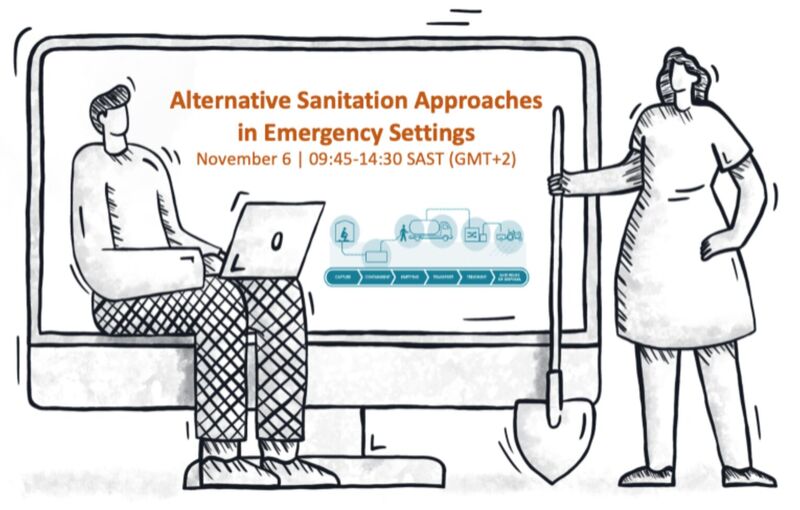Events
Alternative Sanitation Approaches in Emergency Settings
Author: Bill and Melinda Gates Foundation
Year: 2024
From November 5 to November 8, 2024, the Bill & Melinda Gates Foundation hosted a learning session in Johannesburg, South Africa, focused on “Alternative Sanitation Approaches in Emergency Settings”. Convening 50 diverse stakeholders, attendees participated in a range of presentations, exercises, and panel discussions that explored current challenges, gaps, and emerging opportunities in sanitation responses. Key sessions of the event have been live-streamed via the SANIHUB and the recordings, presentations and other relevant resources can be accessed and downloaded through the links below.
A summary of key discussions emerging from the convening:
- Integrating climate into sanitation interventions: Across the various use cases presentations and discussions during the convening, climate emerged as a cross-cutting theme, if not a key factor, across interventions. In mainstreaming climate into sanitation approaches, some participants noted that climate is often integrated in solutions for low-income contexts. This suggests the potential to frame climate-conscious solutions for larger populations, especially to increase their potential for commercialization, cost efficiency, and product popularization. Mainstreaming climate into sanitation, and vice-versa, will need further research and design for interventions to holistically consider these factors. Attention was also brought to aligning sanitation with climate policy through tools like Nationally Determined Contributions (NDCs) and Global Climate Fund investments.
- The humanitarian–development nexus, and shifting towards sustainable, longer-term solutions: A key theme throughout the convening revolved around the humanitarian-development nexus. Defining this nexus and applying its concepts to planning and design is important for WASH practitioners to design interventions that respond to emergencies while building resilience in the long-term.As current systemic challenges to mid-/long-term response affect the entire WASH community, this shift would require all actors to rethink how solutions are planned, designed, and marketed. Some attendees noted that criteria like public health impact, climate resilience, and improving livelihoods need to be emphasized for donors to recognize and understand the relevance of sustainable solutions.
- Innovation in technology and approach: The convening allowed participants to discuss where and how innovation can be integrated into sanitation interventions. In terms of technology, participants noted a need for both technological innovation and an enabling, innovation friendly environmentto take innovations to scale. The latter includes several elements, like rethinking business models or reconsidering the trade off between capital and operational expenditure. Innovating in approaches can also mean engaging closely with communities in planning/implementation to make sure they own their technologies or integrating user-/community-centered design to make interventions respondent to both user behavior and supply chain/market realities.
Overall, the convening was able to catalyze actionable insights and commitments from participants, indicating a heightened will to explore, learn about, and invest in alternative sanitation approaches both individually and organizationally. Allowing participants to make new connections, hear/share their unique perspectives, and break out of their respective siloes, the learning session was successful in building momentum among attendees for sanitation innovation across the sector.
Rating
Would you like to see other resources here?
Give us your feedback"*" indicates required fields
Related Resources and Tools
IHE, Delft - Online Course on Project Management for Sanitation
FSM TWiG Session - Lessons Learned from Cox's Bazar, Bangladesh
A session hosted by the Technical Working Group (TWiG) of the Global WASH cluster, organized…
FSM TWiG Session - Sustainable Sanitation for long term responses with reducing budgets
FSM TWiG members and invitees discussing the challenges and mitigation approaches for sustainable sanitation services…
Approaches to Finance for Sustainable WASH Systems (UNICEF/IRC)
Free online course available in French and English via the UNICEF Agora platform. The course…
WASH Session: Faecal Sludge Management (2023)
Proceedings from the virtual WASH Session on Faecal Sludge Management held in November 2023, including…
WASH Session: Faecal Sludge Management (2022)
Proceedings from the virtual WASH Session on Faecal Sludge Management held in November 2022, including the following…
IHE, Delft - Online Course on Project Management for Sanitation
FSM TWiG Session - Lessons Learned from Cox's Bazar, Bangladesh
A session hosted by the Technical Working Group (TWiG) of the Global WASH cluster, organized…
FSM TWiG Session - Sustainable Sanitation for long term responses with reducing budgets
FSM TWiG members and invitees discussing the challenges and mitigation approaches for sustainable sanitation services…
Approaches to Finance for Sustainable WASH Systems (UNICEF/IRC)
Free online course available in French and English via the UNICEF Agora platform. The course…
WASH Session: Faecal Sludge Management (2023)
Proceedings from the virtual WASH Session on Faecal Sludge Management held in November 2023, including…
WASH Session: Faecal Sludge Management (2022)
Proceedings from the virtual WASH Session on Faecal Sludge Management held in November 2022, including the following…
Still have questions?
You could not find the information you were looking for? Please contact our helpdesk team of experts for direct and individual support.


